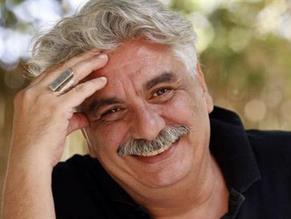|
World Jewish News

Gilles Jacob Lellouche, who owns a restaurant in La Goulette, Tuni's port suburb, was the sole candidate of Jewish origin out of more than 10,000 registered in the vote for a new assembly.
|
Tunisia's Jews 'wait and see' after Islamist election win
02.11.2011, Jews and Society Gilles Jacob Lellouche, a member of Tunisia's small Jewish minority, shrugs as he contemplates the future under a government run by the Islamic party that swept the country's first free polls.
"We will wait and see," he said about fears that minority freedoms may be under threat.
Lellouche smokes one cigarette after the other on the front porch of the kosher restaurant he owns in Tunis' port suburb of La Goulette, where many Jews live, discouraged by the secular left's splintered election showing.
"The people have spoken, and they have chosen that (Islamist Ennahda) party," he told AFP. His left index finger still sports the mark of pride of Tunisians who voted in Sunday's historic polls -- a fading blue ink stain.
Lellouche was the sole candidate of Jewish origin out of more than 10,000 registered in the recent vote for a new assembly that will rewrite the constitution -- the first-ever in Tunisia not to have a pre-determined result.
He stood for the Popular Republican Union, which won one seat that went to another candidate.
The businessman takes comfort in the fact that the Islamist party did not obtain an outright majority.
"Tunisians are not ready to open the doors to a new dictatorship having just left behind another. But we have to be vigilant," he said.
Asked if people in the Jewish community were positive about a future under Ennahda, he replied: "They are not negative. There is a substantial difference ..."
Tunisia has one of the Arab world's largest Jewish minorities, estimated at 1,500 people out of a total population of more than 10 million.
According to Dar el Dekra (House of Memory, in Arabic), an organization for the preservation of the Jewish heritage in Tunisia, their presence dates back 2,000 years -- mainly on the island of Djerba in the Gulf of Gabes.
They numbered in the tens of thousands until World War II, after which many left for Israel, established as a state in 1948, and France, the colonial power until 1956.
Lellouche noted that Tunisia has a long history of "inter-community conviviality" and said he believed Islam to be a "tolerant" religion.
But in March, two months after the toppling of dictator Zine el Abidine Ben whom the West regarded as a bastion against Islamization, a group of Muslim men assailed Jews outside the Tunis synagogue, the biggest among only a handful in the country. "Be gone the Jews, the army of Mohammed is back!" they shouted.
The interim government condemned the attacks.
The following month, the Israeli government made funding available to help Tunisian Jews move to Israel, citing "the worsening of ... society's attitude toward the Jewish community" since Ben Ali's ouster.
‘My passport is ready'
"If something happens that frightens the population we will arrive at the same result we did after 23 years of Ben Ali-ism, that is to say another revolution," said Lellouche.
His restaurant, Mamie Lily, is named for his 85-year-old mother who is the chef. It serves customers from home and abroad from a menu of Mediterranean dishes, all prepared in the kosher tradition, and the list of main courses are printed over a picture of a Lellouche family bar mitzvah.
"All kinds of people eat here, Muslims, Jews, expats," said Lellouche.
The rabbi of Tunis, Hain Bitan, told AFP: "We have lived here for hundreds of years, we have created a good life together. We are not afraid."
"The Jews are our friends," a Tunisian shopowner told AFP while giving directions to a Jewish old-age home in La Goulette, which is protected by police guards.
Inside, 78-year-old Liliane Bessis told AFP: "I am Tunisian. This is my country. When I was a child, I went to the Catholic cathedral, to the Protestant church, even to mosque. We are all children of God."
She said she had never even heard of Ennahda.
Not all shared her calm. "Even the Arabs are worried," said a 30-something kosher butcher in the capital Tunis, who declined to give his name. "There is fear that Islam will be imposed ... women forced to walk around veiled.
"If there is even the slightest danger, the Jews will leave. We all have family elsewhere, in France, in Europe," said the butcher, wearing a Jewish skullcap and a full beard, sitting outside his small shop across the street from the synagogue -- just a few hundred meters from a large mosque.
"My passport is ready, and I have set aside money for a ticket," he added.
Lellouche blames Ennahda's success partly on decades of dictatorship that left Tunisia with no culture of political debate.
"Tunisians found themselves in a political supermarket. Those who sold the best ideas came out on top.
It is up to us in politics to revise our manner of selling ideas," he said.
EJP
|
|
